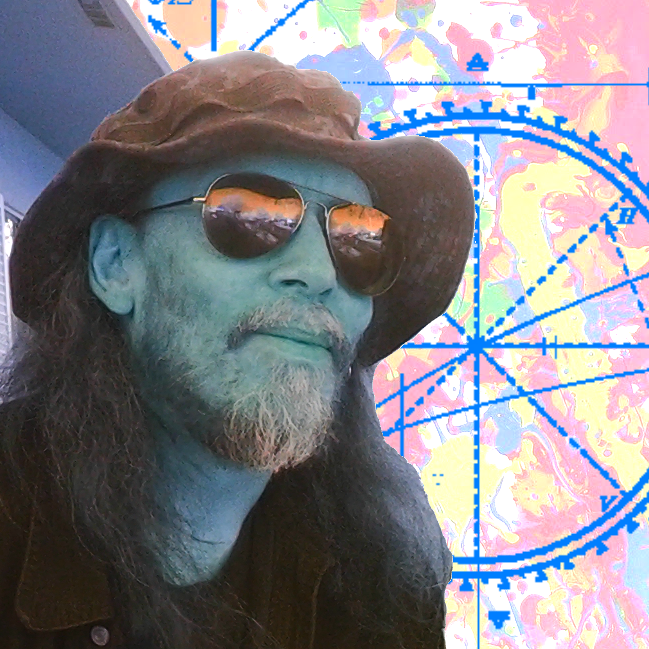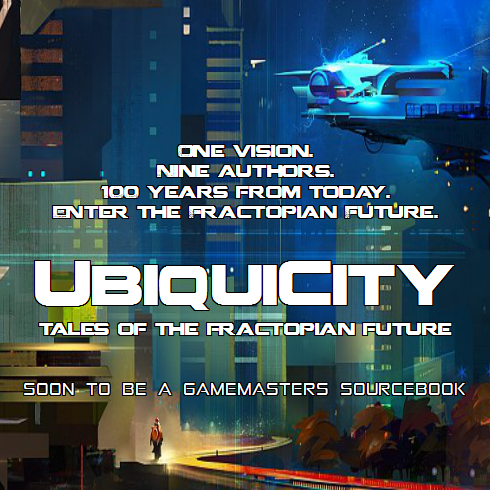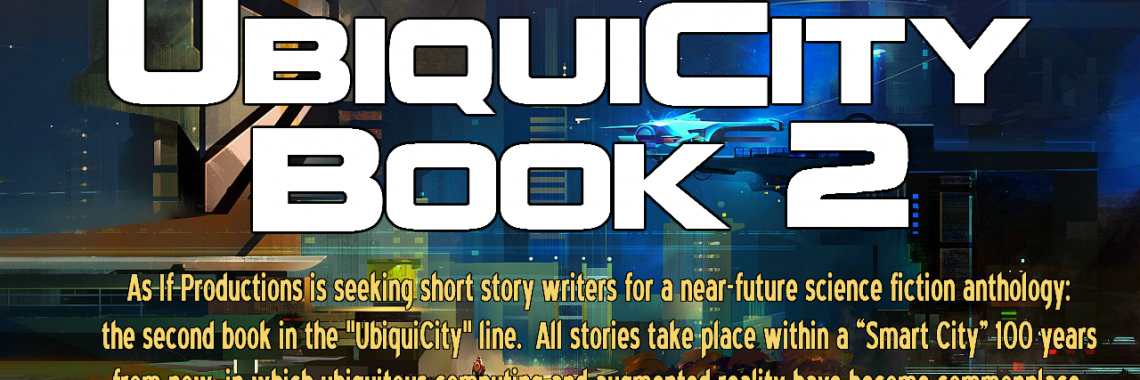Tamra Lucid: What inspired you to pioneer UbiquiCity?
Tod Foley: The perception that the future is harder to predict now than it probably has ever been, and a desire to envision how various trends on the horizon of development today will intersect tomorrow, affecting our cultures and ways of life. My surreal SF roleplaying game “DayTrippers” was based in a world 100 years hence, so that’s why I started thinking about all of this in the first place (i.e. “What is the world of DayTrippers like?) But the DayTrippers multiverse is very fast and loose, with lots of satire and gonzo weirdness. Spurred on by my research of emerging technologies, I wanted to take a more serious look at our possible future, both inductively and deductively. I began by creating a sort of “bible” for the UbiquiCity world, including a timeline of technologies running from the present day to 100 years hence.
Is the intent of UbiquiCity to create a vision of the most likely evolution of modern capitalism in the explosion of technology? Or is this a satire of modern society?
It’s hard to avoid including bits of satire. I’ve written a lot of it and I consider it an important tool in the arsenal of rhetoric, so yes, you will find it in there. But your first impression was more generally correct: UbiquiCity is an attempt to be entertaining as literary fiction while examining the intersection of various emerging technologies and their possible effects on us. That said, the stories in the collection strike a number of very different tones: postmodern satire, action/adventure, existentialist ennui, parable, even blank verse.
Will the atlas of characters grow indefinitely? How do you choose characters for inclusion?
The books are brainstormed collectively in a series of online meetings via Google Hangouts, and details are hammered out on an archived email discussion list. Early on, each author comes up with a main character for their own story, trying to do someone of a type, location and social class that hasn’t been done yet. Then the whole group brainstorms on interesting ways to incorporate or intertwine various characters, locations and technologies. We consider cool ideas for roleplaying scenarios. We encourage collaboration and crossovers, and some characters make major appearances in more than one story. In general it’s one main character per author. The open brainstorming and constant contact keeps us from creating things that are either contradictory or too similar.
Did you always know Team Ubi would be a collaboration or did you start solo?
I started solo, and the original idea was just to create a sourcebook for science fiction gamemasters. Most of my projects are self-contained, self-published, and self-financed (such as it is). But soon after work began on the “bible” I ran into the initial problem: the intersection of technologies soon created a vast and complex network of ideas, and I realized that I needed more brains looking at it. But another flash of inspiration came along with that realization: the idea of creating an anthology of short stories, which would leverage individual ideas with the oversight of a group, working from a shared document. My mind went to “Thieves World” – but for the future – and the whole project took form.
NOTE: “Thieves World” was a line of fantasy anthologies set in the superbly detailed fictional city of Sanctuary, written by multiple authors and curated/edited by Robert Asprin. The popular book series eventually led to the creation of a roleplaying game supplement published by Chaosium, allowing players to venture inside the world so beautifully presented in the books, and to interact in-game with the characters they’d come to know in print.
How did you find people to collaborate with?
Social Media! I began by starting a public collection of research material on Google+, articles about augmented reality, AI, automation, ubiquitous computing, etc. After a few weeks of working on version 1 of the “UbiquiCity Bible” I announced the book project on G+, Facebook, Twitter and several game-related forums. I was looking for SF writers with experience in playing or writing roleplaying games. The RPG design community is actually very tight and well-represented on G+, and most of us came from there. I also approached Deborah Teramis Christian, and she was kind enough to introduce me to DeAnna Knipling and Shariann Lewitt. All of these women are remarkable writers. It took several weeks to gather together a team of ten.
The second time around was much easier. Anyone who follows me on social media knows I’ve been working on this for over a year now. I put out a call for contributors a week ago, and I had ten contributors within 48 hours. We just had our first meeting today.
Will your approach to the second volume of the Tales differ from the first?
In general the approach will be very similar: online meetings, brainstormed crossovers, the UbiquiCity bible, and the email discussion list. Of course this time around the writers have even more material to play with. Several characters and locations from the original book will make return appearances, some of them in the hands of different authors. The only real rule is you’re not allowed to kill or make irrevocable changes to another person’s character; but we stay in touch, so you can always ask.
Can you tell us a little about each of the core assumptions of UbiquiCity?
The core assumptions are:
· We don’t destroy ourselves completely within 100 years
· Corporations govern openly, usurping governments
· Capitalism survives but in a modified sense
· Things become ever-more privatized and automated
· Universal Basic Income and Reputation Economies prevent revolt
· AR, VR, and AI leads to robots and artificial realities
· A super-dense ad-saturated media landscape
· Lots of green technology
· The internet of things
How have you used Facebook, Patreon and other social media to get the word out about UbiquiCity?
Not well enough! I do use all of those platforms, but I prefer to spend my time creating, and it turns out that marketing and promotion are still Sisyphian tasks, even given (or due to?) the massive power of the internet. But you can find “Tales of the Fractopian Future” at all major online booksellers, there’s a website at http://UbiquiCity.info and Book 1 is listed on Goodreads. Mostly I release updates and news to my own Patreon patrons and followers on Google+. I do it a little less on Facebook and Twitter, because frankly, I don’t really like them. Personally, I’m waiting for internet fashion to swing back the other way and we’ll all go back to using forums. No joke!
What is a Fractopia?
I think of it as a sub-genre, actually: neither cyberpunk nor technotopian, but with elements of both. The word “Fractopia” connotes “Fractured,” which is a reference to a highly stratified advanced capitalist economy. It’s not “dystopian” (literally “bad place”), nor is it “utopian,” but instead – like the first world today – it spans and even expands the spectrum of social stratification. In short, the genre is an attempt to predict a capitalist future much like today, but writ larger, with amazing and terrifying new technologies.
But beyond that, a world viewed via augmented reality interfaces is going to be a world which is more subjective, more interior, more fragmented in an ontological sense. There’s no particular reason to assume that the person beside you views the same reality that you do, or that their only identity is the one that you see.
You’ve done your research! Yeah, I edited a garage-VR magazine called “PIX-Elation” back in the early 90s. Like the internet, like programming, hell, like computers at all: my creative works have always involved the creation of fictional environments, from roleplaying games to theatrical presentations to online worlds, and I’ll cotton to any tools that will help me get there. So for me, exploring VR was just sort of a natural step. Today, of course, we finally have the bandwidth and hardware to *build* all those things we could only dimly imagine then. And if what we imagined in the 90s was even half an indication, the world is about to get very, very weird.
We are already seeing the effect of a world divided into perceptive bubbles or “echo chambers”; it has resulted in the fragmentation and polarization of entire cultures. But the one-dimensional rift between “left” and “right” is nothing compared to the complexities of a multi-layered world that’s fragmented right down to the individual level. No two worlds completely alike. Marshall McLuhan spoke of how electronic media altered the workings of the human mind – and that’s true – but in the age of television we were at least all perceiving the same faux “reality” (that of 20th-century capitalism, as projected through mainstream media).
The world of tomorrow’s augmented citizen will be comprised of multiple continually-active visual layers, representing not only navigational and informational displays, but also displays related to their jobs, interests, health, security, finances, entertainment, virtual worlds, games, social networks, and of course, highly-targeted advertisements crafted to psychological precision by AI. In each of these layers you may have a completely different identity, reputation, history, and community. Each of these “layers” is a complex society in its own right. Eventually we will turn our default settings to “always on” – or begin implanting the interface hardware directly into our bodies – and we’ll start to feel “disconnected” when viewing the world without overlays. This is actually a topic we look at from different points of view in UbiquiCity.
What is a 3 string guitar and why do you prefer it to a traditional 6 string?
Another question I did not expect! It all started when I was 18, living on the street, breaking strings and unable to afford new ones. I retuned the guitar and wrote some 5-string songs, broke another string, retuned and wrote some 4-string songs, broke another string, and finally changed my playing style to avoid breaking strings. What I was left with I retuned to a 1-5-8 open rock chord, and began figuring out other chords from there. After a short time I had written or arranged so many 3-string songs, I always had to have a 3string around. To this day, my 3 string Ovation is my primary instrument. The open tuning makes it ideal for blues scales, and the minimalist setup is a fun challenge. Like haiku.
What is Fictioneers?
I coined the word “Fictioneers” to include all aficionados of collaborative fictional spaces: writers, programmers or designers, facilitators (or gamemasters), and explorers (or players). Fictioneers.net is a website I set up to serve as a directory of “indie” roleplaying games. Most of the games I list there are free, and none of them are Dungeons & Dragons. There’s no advertising, though I do have a Patreon for it. Anyone who’s written their own roleplaying game is welcome to submit it to the directory.
You’ve created role playing games like DayTrippers and Other Borders. What attracts you most about creating role playing games?
There are so many directions I want to go with that question, starting with playing, and gamemastering, and finally, designing. What draws me to create interactive fictional environments and emergent narrative spaces? In 5,000 words or less? It’s the demiurge, the desire to create, but blended with the desire to *collaborate*, and also the desire to be *surprised* at what you’ve created. All of those are important. For me, RPG design (and even gamemastering) are “meta-artforms” – they can encompass all others. I have created not only notebooks full of prose and statistical detail for my fictional worlds, but also drawings, maps, poems, alphabets, philosophies, legal systems, inventions and even songs.
Ultimately, the world created by the game designer or gamemaster is an open tool set that can convey whole “gestalts” without limiting itself to a single story. It can emulate any particular historical period, or genre, or narrative structure, or even another medium (“cinematic” roleplaying games are popular, for instance, there are even games that let you play cartoon characters, complete with the physics of the cartoon universe). Roleplaying lets you step into another world for a while, even becoming another person, and explore it as deep as you want to go. The game invites you to contribute your own feelings and ideas into a fictional world, and it interacts with you to create an emergent outcome that’s both unpredictable and logical, both meaningful and different every time. Like any good story. Like life.
More info: http://http.ubiquicity.info/
Patreon for UbiquiCity; https://www.patreon.com/Ubiqui
















